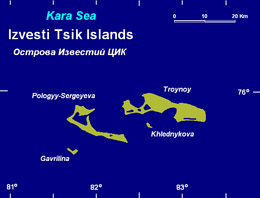Izvestiy TSIK Islands
Russian: Острова Известий ЦИК | |
|---|---|
 | |
 Location of the Izvestiy Tsik Islands in the Kara Sea | |
| Geography | |
| Location | Kara Sea |
| Coordinates | 75°58′N 82°21′E / 75.967°N 82.350°E |
| Total islands | 4 |
| Major islands | Troynoy |
| Area | 200 km2 (77 sq mi) |
| Highest elevation | 42 m (138 ft) |
| Administration | |
| Demographics | |
| Population | 0 |
The Izvestiy TSIK Islands or Izvesti Tsik Islands (Russian: Острова Известий ЦИК), also known as Izvestia Islands, is an island group in the Kara Sea, Russian Federation.
Geography
[edit]The archipelago includes two large and two small islands covered with tundra vegetation, shingle and ice. It is located in the Kara Sea, about 150 km from the coast of Siberia and just 45 km north of the nearest island group, the Arkticheskiy Institut Islands. The largest island is Troynoy with a length of 27 km.[1] The sea surrounding the Izvesti Tsik Islands is covered with pack ice in the winter and there are numerous ice floes even in the summer. The strait between Pologyy-Sergeyeva and Gavrilina Island is known as Proliv Belukha. The wholly submerged Sadko Shoal (Russian: Банка Садко;Banka Sadko) is located roughly 30 km to the NE of Tupoy Point, Troynoy Island's easternmost headland.[2]
Environment
[edit]This island group belongs to the Krasnoyarsk Krai administrative division of Russia and is part of the Great Arctic State Nature Reserve, the largest nature reserve of Russia.[3]
Birds
[edit]The islands are a breeding ground for migratory birds during the brief summer season.[4] They regularly support significant populations of brent geese, king eiders, ruddy turnstones, sanderlings, ivory and glaucous gulls, arctic terns, long-tailed and arctic jaegers, and snow buntings. The archipelago has been recognised as an Important Bird Area (IBA) by BirdLife International.[5]
History
[edit]These islands were named after Izvestiya Tsentral'nogo Ispolnitel'nogo Komiteta, which was the full title of the newspaper Izvestia. A topographic survey of the islands was conducted in 1939.
There is a scientific station (Polyarnaya Stantsiya) on Troynoy Island that was founded in 1953. In September 2016 the weather station was encircled by about 10 adult polar bears as well as cubs, making it dangerous for scientists to exit. A nearby ship was able to deliver dogs and flares to the island, allowing the scientists, who had been trapped for two weeks, to scare off the bears.[6][7]
See also
[edit]Further reading
[edit]- William Barr, Reinhard Krause and Peter-Michael Pawlik, The polar voyages of Captain Eduard Dallmann, whaler, trader, explorer 1830–96.
References
[edit]- ^ "Ostrov Troynoy". Mapcarta. Retrieved 21 September 2016.
- ^ "Banka Sadko". Mapcarta. Retrieved 21 September 2016.
- ^ Nature Reserve Archived 2007-10-08 at the Wayback Machine
- ^ *P.S. Tomkovich (1994). "Breeding conditions for waders in Russian tundras in 1993". Wader Study Group Bulletin. 75: 27–34.
- ^ "Izvestiy Tsik islands". BirdLife Data Zone. BirdLife International. 2024. Retrieved 2024-08-23.
- ^ Tharoor, Ishnaan Russian scientists are ‘besieged’ by polar bears at a remote Arctic post Washington Post. September 13, 2016
- ^ Luhn, Alec; Hunt, Elle (14 September 2016). "Besieged Russian Scientists Drive Away Polar Bears". The Guardian. Retrieved 14 September 2016.
External links
[edit]- Account of an expedition of amateur radio operators with photographs (Russian)
